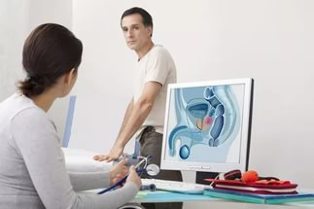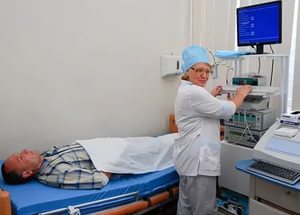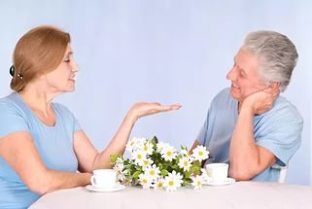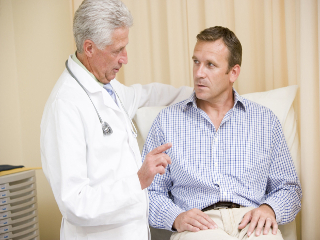
Inflammation of the prostate gland is a common reason for a man to go to a urology clinic.
Treatment of prostatitis involves identifying the cause of the disease and prescribing specific medications to improve prostate function.
In addition, an active lifestyle, regular exercise and physiotherapy play an important role in therapy.
There is also nothing against the treatment of prostatitis using the traditional medical prescriptions of urologists. It is better to use them at the same time as medication to prevent exacerbation of the disease.
Causes of Prostatitis:
- obstruction in the pelvic region due to a sedentary lifestyle;
- sexually transmitted diseases;
- urinary tract infections;
- to abstain from sexual intercourse for a long time;
- disconnection;
- Complications after urethral catheterization;
- constant hypothermia;
- abuse of alcohol, spicy and spicy foods;
- Infections of other organs (eg, tonsillitis, sinusitis, pneumonia, caries) against the background of weakened immunity.
Acute and chronic prostatitis differ in the form of flow.
Depending on the etiological factor, the following forms of the disease are distinguished:
- Acute bacterial prostatitisis mainly caused by gram-negative pathogenic microflora. These are E. coli (Escherichia coli), gonorrhea (Neisseria gonorrhaeae), Trichomonas (Trichomonas vaginalis).
- Chronic bacterial prostatitisis diagnosed in almost 30% of cases. The main cause is infection with chlamydia (Chlamydia trichomonas), ureaplasma (Ureaplasma urealyticum), mycoplasma (Mycoplasma). The disease can occur both independently and as a complication of the acute form of the inflammatory process of the prostate gland.
- Granulomatous prostatitisis relatively rare. It causes syphilis, genital tuberculosis, and fungal infections.
- Chronic non-bacterial prostatitisis more common in men over 50 years of age. The main reason is age-related circulatory disorders.
The secret of the prostate gland has a certain antimicrobial activity and is effective in combating infection.
Therefore, the development of a bacterial pathology usually occurs when there is an obstruction in the genital area. For this reason, some experts consider bacterial prostatitis to be the initial stage of non-infectious chronic inflammation.
Acute form of the disease is usually accompanied by the following symptoms:
- feeling of heaviness in the perineal region, especially when sitting;
- Increased urination is sometimes false due to compression of the urethra by an enlarged gland;
- difficult, painful urination;
- pain in the perineum of the penis and anus;
- foreign body sensation in the rectum;
- pain during bowel movements;
- The temperature rises to 38-40 degrees.
If the treatment of acute prostatitis is started quickly, the patient's condition improves in 3-4 days. However, in the absence of adequate therapy, there is a risk of developing a purulent abscess of the prostate gland. This requires emergency medical care in a hospital setting. Below are the symptoms of chronic prostatitis.

Pain. It is different and can occur during urination, ejaculation or rest. Violence depends on many factors. Sometimes a man complains of only a feeling of heaviness, and in some cases pain medication is required. The localization of pain is also different - in the perineum, glans penis, testis or rectum.
Urinary diseases.This is a frequent urge to go to the toilet, especially at night, a slow intermittent flow of urine, a feeling of a sufficiently empty bladder. Sexual dysfunction manifests itself in the form of premature ejaculation or weakening of the erection.
Psychological symptoms.Patients complain of insomnia, increased sweating, irritability and rapid fatigue. These symptoms go into remission and worsen when the process is activated. Experts emphasize the need to distinguish inflammation from prostate adenoma.
Adenoma is a benign hyperplasia (growth) of an organ. The disease is associated with age-related changes in the hormonal background of men and requires consultation with an andrologist. The doctor treats prostatitis by prescribing drugs for local (suppository) and systemic use (pills and injections in the acute course of the disease).
Therapy focuses on:
- cessation of bacterial activity;
- improving microcirculation and blood circulation;
- elimination of edema;
- cessation of the inflammatory process;
- normalization of the flow of secretions from the prostate gland;
- improve the immune system;
- if necessary - correction of hormonal disorders.
According to patients, the effectiveness of drug treatment of prostatitis increases with the simultaneous consumption of sources and tinctures from different herbs:
- pumpkin seed oils;
- parsley leaves, roots and fruits;
- beekeeping products (honey, propolis, bee bread, zabrus);
- aspen bark;
- celandine juice;
- chestnut peel;
- hemlock tinctures.
Juice therapy has recently gained popularity. This technique helps to cleanse the body of toxins, strengthen the immune system, normalize the intestines, liver and kidneys, and stabilize weight. In addition to treating prostatitis, juice therapy helps to cope with many other chronic diseases. You can read the details of this method in specialized forums.
Treatment of prostatitis in men: drugs and their principle of action
In addition to physiotherapy procedures such as transrectal massage of the prostate gland and thermal microwave therapy, the following groups of drugs are prescribed for the treatment of prostatitis in men:
- antibiotics;
- non-steroidal anti-inflammatory drugs;
- herbal and biological preparations;
- angioprotectants and vasodilator drugs;
- α-blockers;
- antispasmodics;
- 5-α reductase inhibitors;
- immunomodulators.
Antibacterial drugs for the treatment of prostatitis in men are almost always prescribed, regardless of the form of the disease. This is not entirely true.
The appropriateness of the use of antibiotics should be confirmed by laboratory tests.Perform a so-called bacterial culture of prostate secretions. Research shows not only the presence or absence of pathogenic microflora, but also sensitivity to certain antibacterial drugs.
The duration of therapy is between 2 and 4 weeks, if necessary, lasts a month.When prescribing a drug, consider its ability to accumulate in the tissues of the prostate gland. It has fluoroquinolones, penicillin antibiotics, lentosamides, tetracyclines, macrolides. Sometimes antimicrobial therapy is indicated when non-infectious prostatitis is at risk of complications with bacterial infection. The dose of the drug is calculated individually based on the patient's age, condition and the presence of diseases of the kidneys, liver and digestive system.
For the treatment of acute prostatitis in men, doctors prefer to inject and then switch to pills. Nonsteroidal anti-inflammatory drugs (NSAIDs) are used to relieve pain and edema.The effect of the drug is based on the inhibition of prostaglandin synthesis and platelet aggregation - the main factors in the development of the inflammatory process and the accompanying pain, fever and swelling.
In the treatment of prostatitis in men, the drug is suitable for topical application in the form of suppositories. This ensures rapid absorption and maximum concentration of the active substance in the body. Spasmolytics and α-blockers facilitate urination with inflammation of the prostate gland. Experts attribute the difficulties not only to the mechanical compression of the urethra by the enlarged prostate, but also to the emptying of the bladder.
The cause of this symptom is also a reflex spasm of the smooth muscles of the urinary tract. Complicated urination or a completely empty bladder can lead to secondary bacterial infections, sand accumulation, and stone formation. The action of adrenergic blockers develops gradually. Almost 90% of patients experience improvement 1-2 weeks after starting treatment. Antispasmodics "work" a little faster, in addition to relieving pain.

Phytopreparations and drugs based on the secretion of the prostate gland in tablets or suppositories of animals have a complex effect. They do not have the same effect as synthetic drugs.
In men, phytopreparations for the treatment of prostatitis are used either as part of complex therapy or in remission to prevent exacerbation of the disease.Angioprotectors can be used in capsule or ointment for external use. Their action is aimed at normalizing blood circulation in the prostate gland. Improving venous flow helps in the early removal of inflammatory exudate and the elimination of swelling.
In the treatment of prostatitis in men, immunomodulators are used to strengthen the body's defenses. The fact is that the weakening of immunity plays an important role in the development of inflammation; In this case, the risk of various bacterial complications increases. Thymus drugs, interferons and stimulants of their own immunity are widely used.
In addition, multivitamin complexes are used to treat prostatitis in men(depending on the price of the patient and the manufacturer decides which drug to choose). Insomnia, mild tranquilizers and antidepressants are indicated with strong nervous tension. If the ultrasound examination of the urinary system shows the accumulation of sand in the kidneys, appropriate drugs are selected to prevent the formation of stones.
How to treat prostatitis at home: diet, exercise, traditional medicine recipes
The prostate gland is the main organ of the male reproductive system, so many are interested in the need for hormonal therapy in the development of the inflammatory process. Experts agree that such drugs are necessary only if there is no effect from the basic therapy of advanced prostatitis. Especially applicable:

Preparations of the glucocorticoid group. It is determined locally using electrophoresis to reduce side effects and systemic effects.
Inhibitors5-αreductase. Drugs in this group are not hormones. Their mechanism of action is based on reducing the effect of androgens on the prostate gland. Thus, a reduction in body size and relief of prostatitis symptoms are ensured.
Testosterone to improve sexual function. It is rarely prescribed after blood tests for medical reasons and the content of essential hormones. Doctors recommend increasing the effectiveness of drug treatment and reducing its duration using the arsenal of traditional medicine.
How to treat prostatitis using folk recipes:
- Peel a chestnut, grate it and cover it with a glass of vodka. Insist in a cool, dry place for 14 to 20 days. Then filter and add 100 - 150 ml of clean water at room temperature. Take 10 drops twice a day on an empty stomach for 2 weeks. Then you should take a break for seven days and repeat the course of treatment.
- Pumpkin seed oil is recommended to drink a tablespoon before each meal.
- Heat a glass of vegetable oil in a water bath and add 2 tbsp. crushed propolis and continue to heat until completely dissolved. Use the resulting mixture as an ointment once a day before bedtime. The duration of treatment is 28-30 days.
Regular prostate massage has a good effect. You can do it yourself, ask for help from a loved one, or use one of the many special devices on the modern market. Contraindications to massage are the formation of stones in the prostate gland (calculus prostatitis).
In addition, such a procedure is not recommended in case of exacerbation of the disease, accompanied by pain and fever. In addition, exercise helps in deciding how to treat prostatitis. Moderate exercise is an excellent prevention of congestion in the area of obesity and helps fight obesity.
Urologists recommend the following elements of gymnastics:
- Kegel exercises consist of rhythmic tension and relaxation of the perineum muscles. They should be performed 3-4 times at least 30 times a day.
- Walk up the stairs or lift your knees to your chest while standing.
- squat.
- "Birch tree".
- Raise your legs on the bar.
You can also take a video yoga class.Inverted asanas and breathing exercises will help treat prostatitis. However, this does not mean that you can continue to lead a sedentary lifestyle after exercise. To effectively prevent prostatitis and impotence, experts recommend that members of the stronger sex exercise as much as possible.
Hirudotherapy is a good addition to traditional methods of treating diseases. Course 8 - 9 procedures, it is better to start them in the early stages of the acute inflammatory process.
The effectiveness of the manipulation depends on the following factors:
- leech releases hirudin during the procedure, which thins the blood and facilitates circulation;
- edema passes due to the discharge of inflammatory exudate;
- Reflex action at active points in the pelvis and genital area.
It is almost impossible to treat prostatitis without a proper diet. Alcoholic, spicy, smoked, spicy and salty foods should be avoided. Juices made from green vegetables (especially spinach, greens), lean meat and fish should be preferred, and plenty of fluids (water, compotes, fruit drinks) should be drunk.
Zinc is good for all ages. This mineral stimulates spermatogenesis, improves the quality of male sperm. It is found in large quantities in beef, pine nuts, peanuts and legumes.
However, despite all the efforts of doctors, it is not possible to treat bacterial or infectious forms of prostatitis with severe edema and pain with the help of drugs and physiotherapy. In such cases, only surgery will help. To prevent this, you need to monitor your weight and exercise for your age and health. It is also necessary to avoid hypothermia and prevent the development of chronic infections.
Drugs for the treatment of prostatitis
The choice of medication for the treatment of prostatitis requires an individual approach. When prescribing medication, the doctor should take into account the presence of contraindications, the characteristics of the disease and the cost of drugs for the treatment of prostatitis.
As you can see, there are a wide range of agents for the treatment of prostatitis. However, high cost does not always mean efficiency. Only a doctor should choose drugs for the treatment and dosage of prostatitis. A specialist should be consulted before using traditional medicine with honey or herbs.
Draw conclusions
Prostatitis is one of the most common male diseases in the world. However, few people know that seven out of ten men who suffer from prostatitis die from prostate cancer.
It is especially frightening that most men completely ignore the symptoms of prostatitis and can no longer help when they see a doctor.
Prostatitis symptoms:
- Pain in or under the abdomen, scrotum or perineum
- Frequent urination, burning sensation in the urethra
- “completely empty bladder I feel
- Difficulty urinating (weak flow)
- Violation of the duration and quality of an erection
- Premature ejaculation or problem getting it
- Increased body fatigue and irritability
Even one of these symptoms should surprise you. And if you have two of them, do not doubt - you have prostatitis.
























